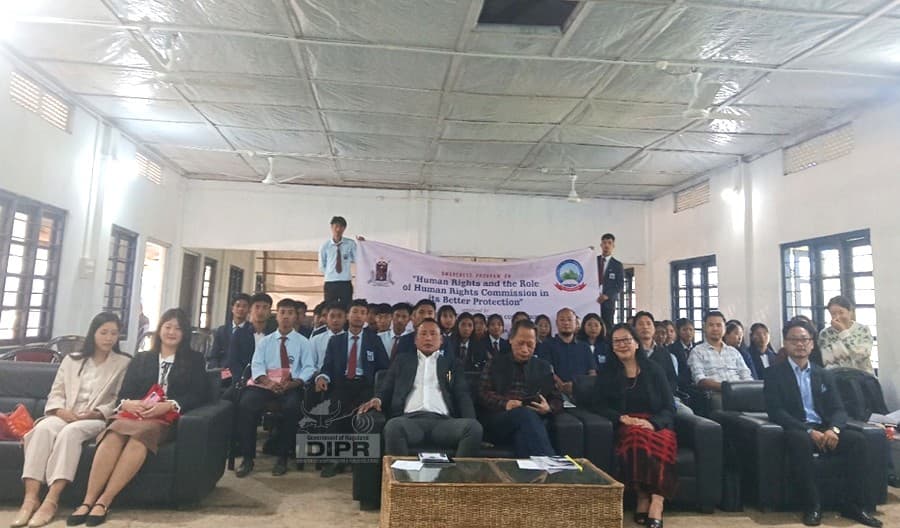THURSDAY, NOVEMBER 20, 2025
- Home
- Human greed, selfishness root causes of conflict, says Nagaland human rights commission chief
Human greed, selfishness root causes of conflict, says Nagaland human rights commission chief
Chairperson of Nagaland State Human Rights Commission (NSHRC) Songkhupchung Serto says human greed and selfishness root causes of conflict in any society
Share

DIMAPUR — Chairperson of Nagaland State Human Rights Commission (NSHRC), Justice Songkhupchung Serto (Rtd.) noted that human greed and selfishness are the root causes of conflict in any society.
He also stated that there is “no peace without human respect and no development without peace.”
The NSHRC chairperson was addressing students and faculty members of Wangkhao Government College, Mon, during an awareness programme on ‘Human rights and the role of Human Rights Commission in ensuring better protection’ on November 19.
The programme was organised by the NSHRC, in collaboration with Internal Quality Assurance Cell (IQAC), Wangkhao Government College.
Speaking on the historical roots of human rights, the Serto explained that the modern human rights movement emerged in response to the atrocities of the First and Second World wars.
He stated these global tragedies underscored the urgent need for nations to safeguard human dignity and codify universal rights, leading to the Universal Declaration of Human Rights, a cornerstone in shaping human civilisation.
This declaration guarantees equality, freedom, justice, and protection of life and liberty, he stated.
Also read: Nagaland and NCPCR officials call for stronger implementation of child rights laws
Justice Serto highlights Nagaland State Human Rights Commission's role in Mon, Tizit
Serto also elaborated on the functioning and powers of human rights commissions, stressing their crucial role in ensuring accountability for rights violations by authorities, including government bodies.
He noted that the commission can intervene, recommend action, and provide relief when a government authority infringes on individual rights.
He urged the audience to become ambassadors of human rights, emphasising that safeguarding dignity and justice is a collective responsibility shared by institutions and citizens alike.
The NSHRC chairperson also explained the significance of the Commission's logo and reiterated its mission to protect human rights.
Further, he inspired the students by saying, ‘Education and knowledge are power.’ He reminded them of Dr. BR Ambedkar's quote, “Be educated, be organised, and be agitated,” encouraging them to pursue their studies with dedication.
R Nzanbemo Lotha, NSHRC member, introduced the Commission and explained the concept of human rights. He then presented an overview of the Protection of Human Rights Act, 1993, highlighting that it defines human rights as rights related to life, liberty, equality, and dignity, as enshrined in the Constitution and international covenants.
He elaborated on the structure and functioning of the National Human Rights Commission (NHRC) and State Human Rights Commissions (SHRCs), drawing attention to their powers under Section 13, which include summoning witnesses, receiving evidence, requisitioning documents, and conducting inquiries with powers equivalent to a civil court.
Lotha also discussed the authority of the Commission to inquire into violations and to recommend prosecution, disciplinary action, or compensation wherever necessary.
The programme was chaired by Honjem Konyak, Asst. Professor and coordinator, IQAC, while vote of thanks was delivered by Dokingla, Asst. Professor and secretary, IQAC.
Later, the NSHRC team visited the Government High School and PHC of Phomching, and Government Middle School and PHC of Longwa.

